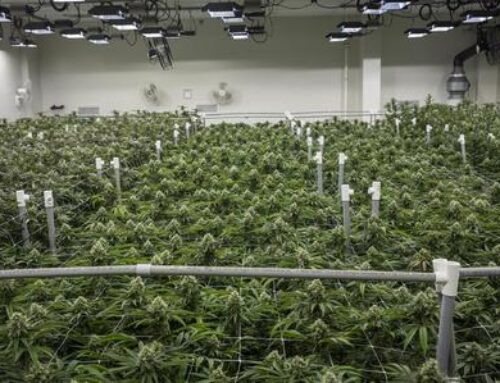The DEA just made a huge change to how the government treats medical marijuana
August 27, 2019
A bland announcement in the Federal Register on Monday may mark the beginning of the end of federal drug cops’ 50-year Reefer Madness crusade.
The federal government announced plans to expand cannabis research Monday, paving the way for the robust clinical trials cannabis experts believe will force the government to downgrade marijuana’s Controlled Substances Act classification.
The decision comes just two days before a key deadline in a lawsuit against the agency brought by cannabis researcher Dr. Sue Sisley of the Scottsdale Research Institute. Sisley had sought to end three years of stalling by the Drug Enforcement Agency (DEA).
Monday’s regulatory filing, and the warm remarks from Attorney General William Barr that accompanied it in a press release, effectively mean Dr. Sisley’s won. Coupled with Barr’s ardently anti-pot predecessor Jeff Sessions’ departure, progress toward looser federal treatment of cannabis may resume.
“Until today, no one could do anything. We were handcuffed, in limbo,” said Shane Pennington, a member of Dr. Sisley’s legal team. “Now they’ve done something. It’s a huge, huge deal.”
The actual notice published in the Federal Register is characteristically dry, but it says the DEA will soon unveil a proposed regulation to govern applications to grow cannabis for scientific and medical research. For half a century, only one grow was legally approved for such purposes — a University of Mississippi facility contracted by the National Institute on Drug Abuse (NIDA).
That monopoly on production has hampered researchers like Dr. Sisley for years. The U-Miss project only produced a handful of strains of cannabis and their cultivation methods produced low-grade flower. Dr. Sisley’s research — which probes cannabis’s potential to treat post-traumatic stress disorder and focuses on combat veterans — required product of higher quality, more consistent quality, and a wider variety of chemical makeups. The subtleties of cannabis chemistry go far beyond the THC that produces a recreational high, and some researchers believe other attributes of the plant might have various psychological and physiological benefits.
A monopoly on production for research meant NIDA and the growers in Mississippi had no incentive to deliver what Dr. Sisley and her peers wanted for their studies.
Back in 2016, the DEA claimed to be ready to smash up NIDA’s single-actor control of research cannabis back. That announcement was greeted with great fanfare in the research and drug policy communities, and prompted Dr. Sisley to apply for a research-grow license from the DEA later that year.
But it was only a departmental policy. There was no follow-through. Nobody at the government would respond to her application or the dozens of others filed since. And because there were no federal regulations related to the 2016 policy memorandum, Dr. Sisley’s attorney explained, it was almost impossible to force the agency to do what it had promised
“They asked for these applications, they acknowledged the importance of this research, and then they did nothing for years,” Shane Pennington said in an interview. But the rulemaking process announced Monday opens the floor to public comments, which in turn obligates the DEA to respond in writing. That writing will generate specific points of contention that courts can review. The final regulations will obligate the DEA to process applications in some specific fashion that will allow would-be research grows to appeal rejections to a federal judge if they believe they’ve been arbitrarily kept out of the market.
Despite the good news, Sisley cautioned Monday that the new regs leave the DEA plenty of room for further shennanigans.
“Now we just need to keep the DEA’s feet to the fire,” Sisley said in a statement. “DEA/DOJ can slow-roll this for many years to come, leaving progress of medical cannabis research in limbo indefinitely. But at least that door is now theoretically kicked open.”
“I am pleased that DEA is moving forward with its review of applications for those who seek to grow marijuana legally to support research,” Attorney General Barr said in a statement on the agency’s move.
The good news for researchers, and those who suffer from the illnesses and difficulties they hope to cure with cannabis products, is only the beginning.
Monday’s announcement is likely to provide a major boost to the push for federal decriminalization or even legalization.
There’s a ping-pong logic at play here, Pennington explained. The DEA has insisted that cannabis remain a schedule I narcotic — the tightest category of criminal enforcement and pharmaceutical regulation under federal drug law — even as half the states in the nation have legalized it for either medical or recreational use. If clinicians like Dr. Sisley succeed in identifying specific medical uses of cannabis or its extracts, and the Food and Drug Administration certifies those findings, that would force the DEA to reschedule cannabis nationwide.
“The only thing keeping it schedule I at this point is that, according to the DEA, there is no acceptable medical use in the United States for marijuana,” Pennington said. “Now, how do you get that? Through clinical trials that show it’s safe and effective. And who’s the gatekeeper there? The DEA and the FDA.”
The DEA filing notes the agency “anticipates that additional strains of marihuana (sic) will be produced and made available to researchers” under the forthcoming regs, and anticipates the changes will “potentially aid in the development of safe and effective drug products that may be approved for marketing by the [FDA].”
That’s a recipe for moving cannabis down to schedule II, and a vindication of the confidence cannabis industry insiders have shown in recent years. The sheer amount of money being made thanks to state experiments with legalization has led many investors and entrepreneurs to view federal legalization as a matter of when, not if.
But as a practical and political matter, rescheduling would be a major signal that the feds are closer than ever to giving up on the drug war’s most destructive lie. Ending federal prohibition isn’t the magic bullet for ending mass incarceration that some advocates have portrayed it as over the years. But it would fundamentally reset the relationship between police and drug users — and the communities where they currently interact as hostiles would stand to gain from the change.
Much like the NIDA monopoly on research growing has effectively locked in Nixon-era Reefer Madness ideas at the federal level by making proper medical research impossible, the DEA’s insistence that pot is so dangerous it must be classified alongside schedule I drugs like heroin has warped funding streams, enforcement priorities, civil forfeiture regimes, and other law enforcement practices with far-reaching effects on communities.
Now, the DEA’s formal announcement it plans to respond to research grow applications sets the stage for all that to change.
“They may deny many of [the applications], but if they register even some… It’ll be the end of the 50-year NIDA monopoly,” Pennington said. “That’s giant.”
This piece has been updated to include comment from Dr. Sisley and to correct a reference to the DEA’s scheduling of other narcotics.
Search
RECENT PRESS RELEASES
Related Post




